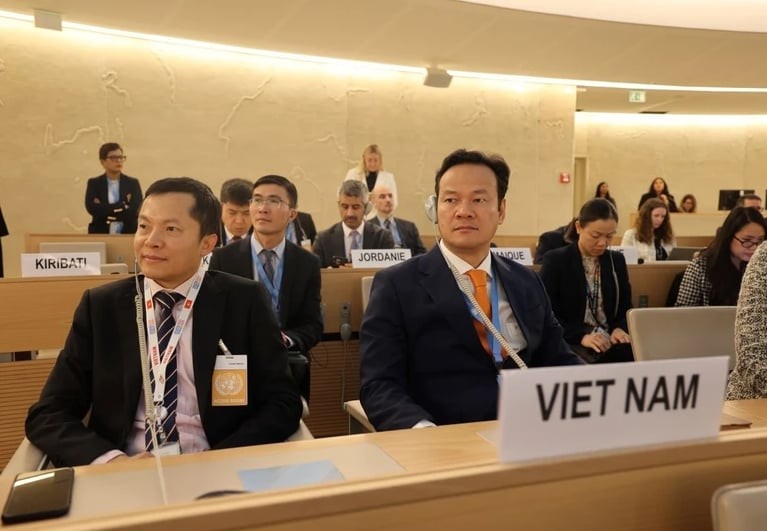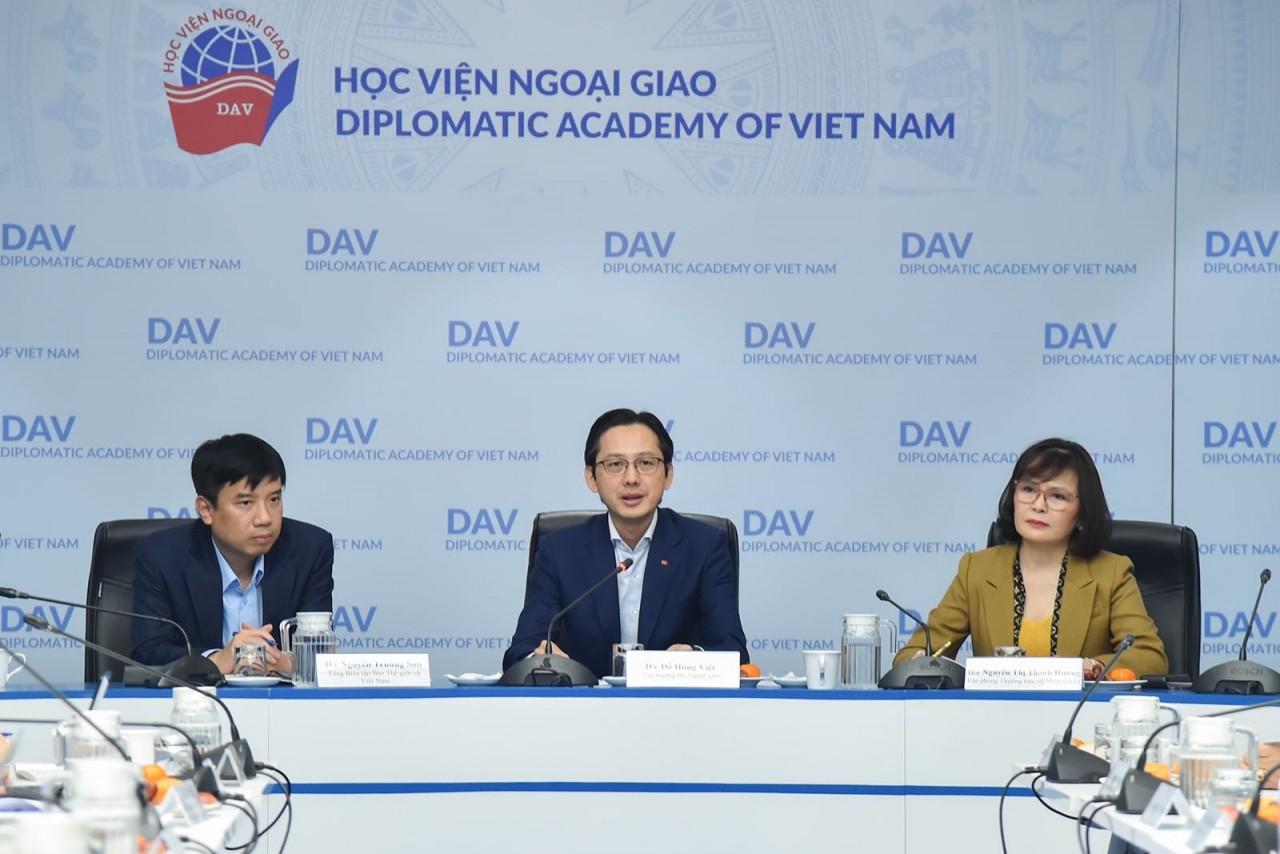Human Rights in Vietnam: Milestones on the Journey for Humanity
| World Peace Council Praises Vietnam’s Human Rights Policies | |
| Vietnam's Efforts to Fulfill its Obligations Under the ICCPR |
"In Vietnam, the highest human right is ensuring that 100 million people experience prosperity and happiness, democracy, peace, security, safety, and well-being, all while maximizing the human potential."
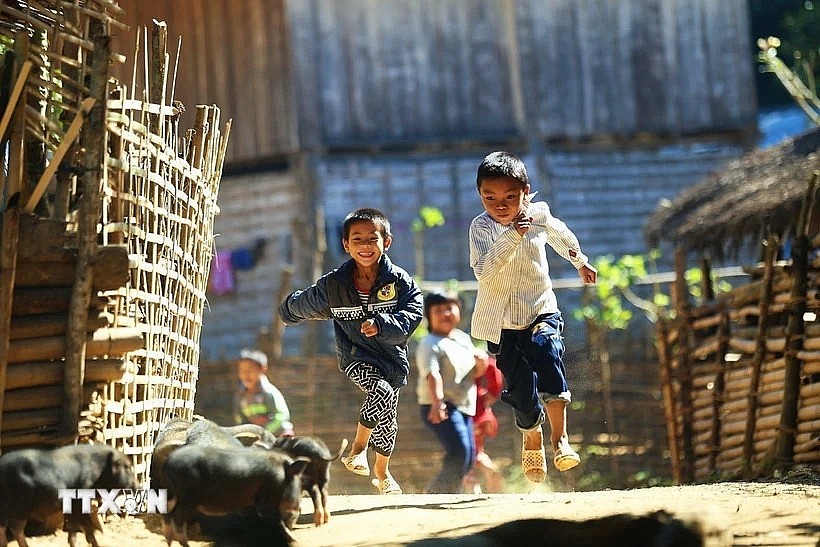 |
| The joy of children in the highlands. (Photo: Phan Tuan Anh/VNA) |
Prime Minister Pham Minh Chinh's statement accurately reflects the Party and State's commitment to ensuring human rights in Vietnam, which is consistently striving to leave no one behind in the development process, which is the essence of the socialist regime in Vietnam.
Vietnam's achievements in ensuring human rights over the 79 years since its founding and nearly 40 years of implementing the Doi Moi process have primarily brought practical benefits to every citizen and enhanced Vietnam's image on the international stage.
It is essential to affirm that the struggle for national independence, unification, and socio-economic development in Vietnam is driven by the highest goal of ensuring the lives and rights of the Vietnamese people. Therefore, all of Vietnam's development achievements are for the people.
Since 2019, Vietnam's average Gross Domestic Product (GDP) has increased by 25%, and the poverty rate has decreased by 1.5% per year. With sustainable poverty reduction solutions and policies effectively implemented in the spirit of 'leaving no one behind,' by the end of September 2024, the national poverty rate will be 1.93%, down 1%.
Social housing construction has achieved positive results; in a short time, over 6,000 billion VND has been mobilized for the movement to eliminate temporary and dilapidated houses.
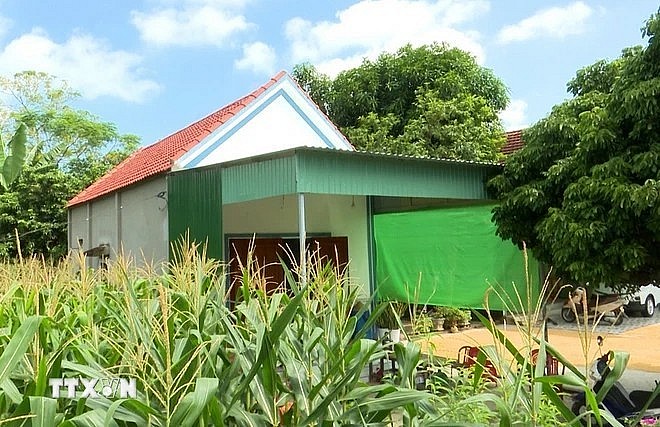 |
| The newly built level 4 house meets the '3 solid' criteria (solid foundation, solid frame-wall, solid roof) under the program to eliminate temporary, damaged, and dilapidated houses for the poor in Hamlet 5, Nghia Dong Commune, Tan Ky District, Nghe An Province. (Photo: Xuan Tien/VNA) |
Vietnam currently ranks 54th out of 166 countries on the sustainable development index, an improvement of one place compared to 2023.
Professor Carl Thayer of the Australian Defense Force Academy, University of New South Wales, expressed strong admiration for Vietnam's economic success, with a growth rate forecasted to reach 6.1-7% in 2024 and a significant reduction in the poverty rate.
He highlighted the achievements that ensure social security and improve the lives of Vietnamese people, such as the increase in the base salary and annual regional minimum wage for workers starting in mid-2024.
Professor Reena Marwah of the University of Delhi, and Secretary General of the Asian Scholars Association, affirmed that Vietnam has made impressive progress in all fields, not only in trade and investment attraction but also in increasing per capita income.
The Vietnamese people have benefited from significant social progress, with per capita income rising from about 200 USD to over 4,000 USD by 2024.
In addition to nation-building achievements, Vietnam has made substantial progress in ensuring human rights across all aspects of social life.
Human rights in Vietnam's civil, economic, political, and cultural aspects are clearly outlined in the Party's policies and guidelines and the State's legal policies.
Jonathan Pincus, Chief Economist of the United Nations Development Program (UNDP) in Vietnam, noted: 'Human development has always been a focus of Vietnam's development policy from the very beginning, and we have witnessed great achievements in Vietnam over the past decade, especially in terms of access to education. Some indicators, such as health, have also improved significantly over the past decade.'
Vietnam's health insurance coverage rate has risen to 94.1%, up from 90.9% in 2000. According to the United Nations World Happiness Report 2024, Vietnam's happiness index increased by 11 places, now ranking 54th out of 143 countries.
UNDP Resident Representative in Vietnam Ramlaal Khalidi highlighted that Vietnam's Human Development Index (HDI) has been steadily increasing for many years, now placing it in the high index group. This achievement underscores a sustainable development orientation.
Professor Carl Thayer noted that Vietnam's commitment to human rights is evident in various areas, including gender equality, sustainable development goals, public health, education, and the treatment of ethnic minorities and the LGBTQ community.
In its second year as a member of the United Nations Human Rights Council for the 2023-2025 term, Vietnam continues to demonstrate its efforts and responsibilities. At the 57th session of the United Nations Human Rights Council, Vietnam actively participated and made significant contributions by chairing and co-sponsoring numerous initiatives, including ASEAN joint statements, the Joint Statement on promoting the human right to vaccination and organizing international seminars and dialogues with the Special Rapporteur on the right to development.
The United Nations Human Rights Council has approved the results of Vietnam's Universal Periodic Review (UPR) cycle IV. Professor Carl Thayer observed that as a representative of the Asia-Pacific region elected to the United Nations Human Rights Council for two terms, Vietnam enjoys strong international support.
Expert Layton Pike, a member of the Advisory Board of the Australia-Vietnam Policy Institute, believes that Vietnam's membership in the United Nations Human Rights Council provides an opportunity to collaborate with Australia and other regional countries to promote basic human rights globally.
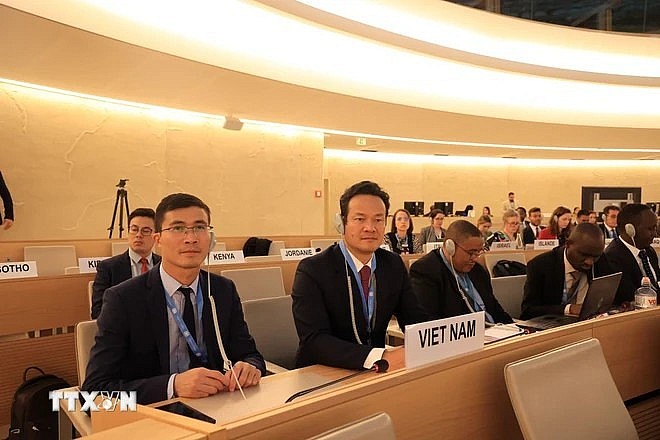 |
| Ambassador Mai Phan Dung, Head of Vietnam's Delegation, and other members of the delegation attended the 57th Session of the UN Human Rights Council. (Photo: Anh Hien/VNA) |
Speaking on the sidelines of the 57th session of the United Nations Human Rights Council, Iraklis Tsavdaridis, Permanent Secretary of the World Peace Council (WPC), praised Vietnam's consistent policy on protecting and promoting human rights. He expressed admiration for Vietnam's achievements in reducing extreme poverty and rapidly improving its international rankings, despite facing many challenges in building and developing the country.
Tsavdaridis firmly believes that Vietnam, as it prepares to celebrate numerous major holidays in 2025, remains committed to human rights, particularly the rights to live in peace, enjoy welfare, live in abundance, and continuously improve living conditions.
In a letter to the National Scientific Conference "Humans, Human Rights are the Center, Goal, Subject, and Driving Force of National Development" held in October 2024, General Secretary of the Communist Party of Vietnam To Lam reaffirmed: 'Implementing a consistent and persistent viewpoint on human rights is the key factor creating the strength of the great national unity bloc, combining national strength with the strength of the times, under the leadership of the Party, bringing the boat of Vietnamese revolution through all rapids, achieving one victory after another...'.
These milestones mark Vietnam's journey in ensuring human rights and are the basis for Tsavdaridis' belief that he will witness Vietnam's significant strides forward in development, ensuring prosperity, happiness, and well-being for its people.
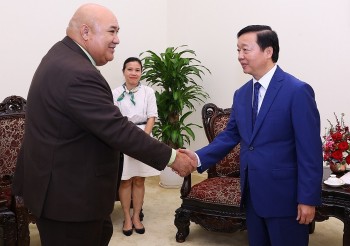 | Vietnam Ensures People's Right to Public Health Care According to WHO, the average life expectancy of Vietnamese people has increased by 15 years, with a significant decline in vaccine-preventable diseases. Vietnam has expanded ... |
 | Vietnam Open in UPR Dialogue, Ready to Assume International Responsibilities Vietnam has shown serious preparation and openness to international dialogue when participating in the UPR dialogue. |
Recommended
 Viet's Home
Viet's Home
Vietnam’s People's Public Security Force Actively Contributes to UN Peacekeeping Operations
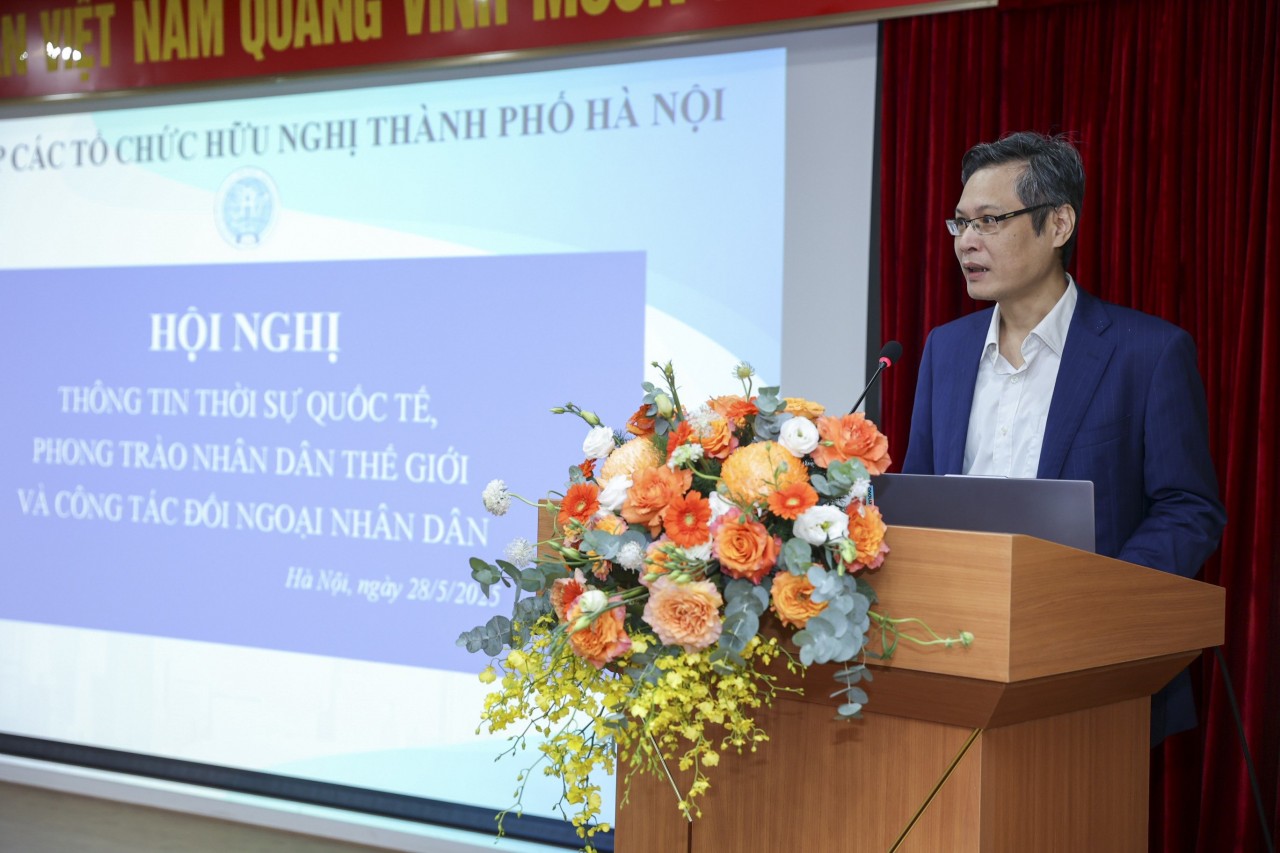 Viet's Home
Viet's Home
HAUFO Enhances Competence of People-to-People Diplomacy Personnel
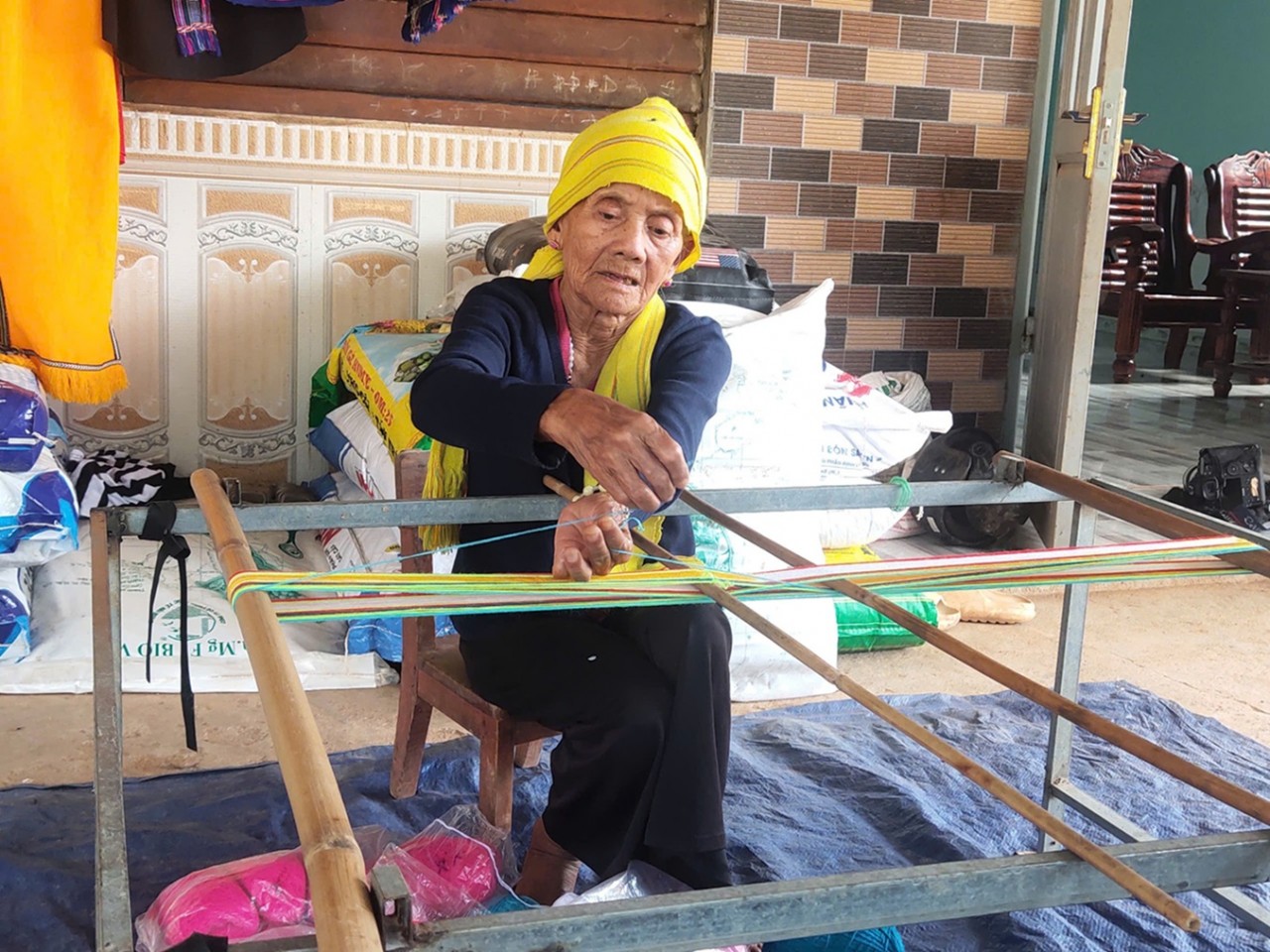 Viet's Home
Viet's Home
Hands that Reserve Da Long Brocade Craft
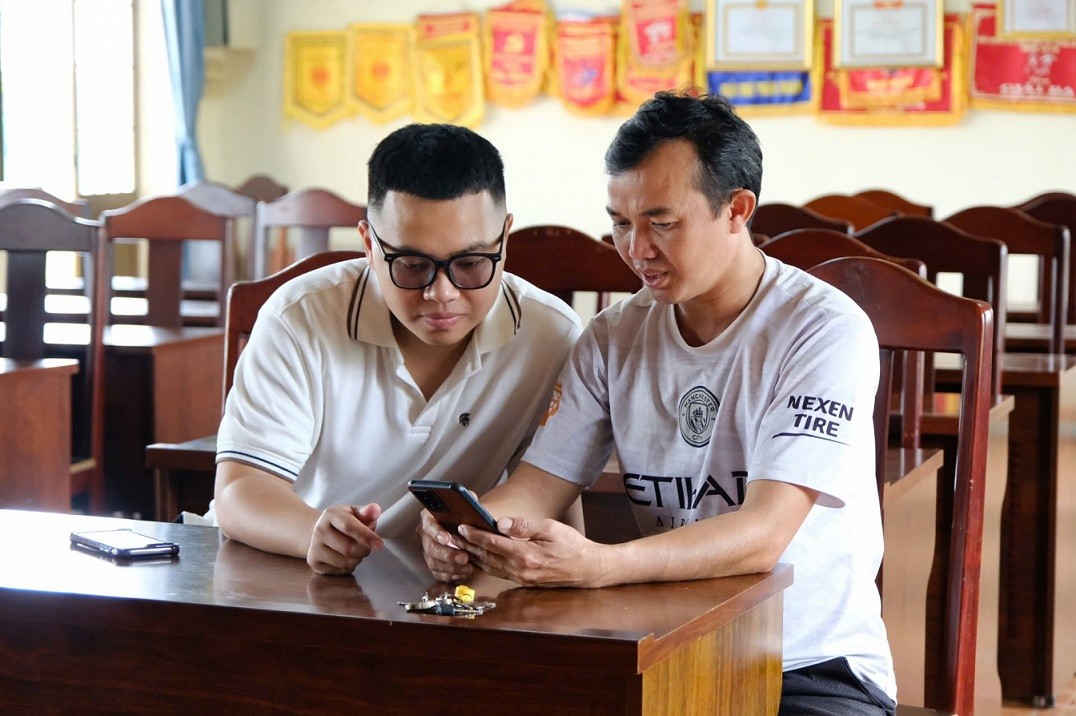 Viet's Home
Viet's Home
Da Rsal – How Digital Transformation Reshape a Poor Commune
 Viet's Home
Viet's Home
Vietnam Classified as “Low Risk” Under the EU Anti-Deforestation Regulation
 Viet's Home
Viet's Home
Vietnamese Architect Wins the Diversity in Architecture Award 2025
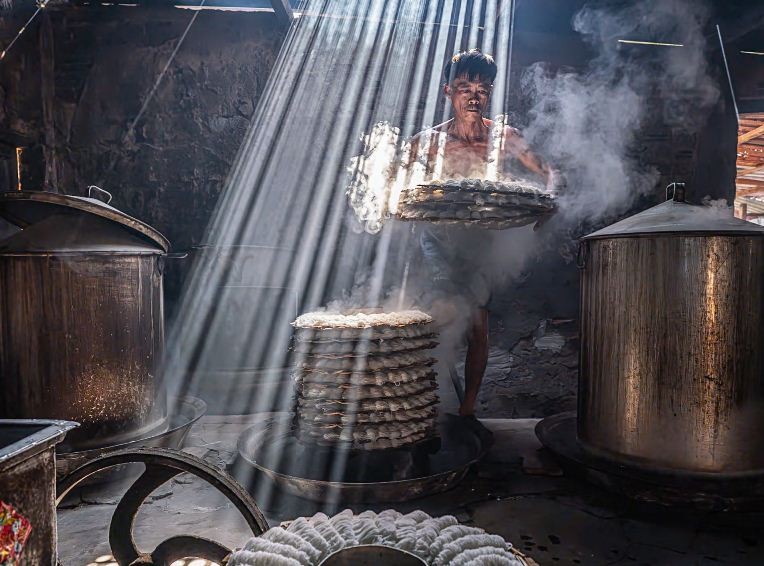 Viet's Home
Viet's Home
Vietnamese Photographer Triumph in Global Food Photography Contest
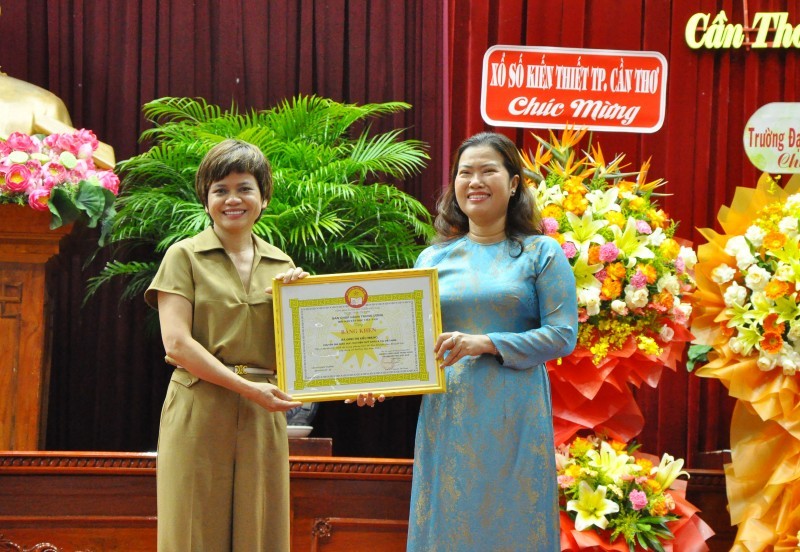 Viet's Home
Viet's Home

